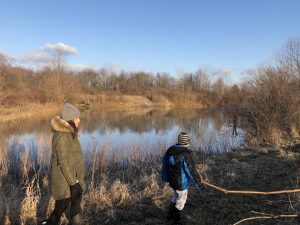“Each Land has the Magic” to Help in These Troubling Times

During this time of self-isolating, curve-flattening, and social-distancing, we find ourselves removed from the comforts and relationships of our normal world. We may feel alone, isolated, distant, afraid, and flattened.
COVID-19 is a reminder that we are part of nature whether we understand that or not. A tiny little life-form previously unknown to us has brought our world to a stop. I have friends in Kenya that are bracing for the impact. My friend in Colombia, Maria, is on lockdown and playing Scrabble with her roommates. And here in Indiana and across the United States we are half-heartedly hunkering while the virus closes in around us.
Nature Therapy
But removed from our day-to-day world, and as disjointed as that may make us feel, maybe it’s another world that can give us comfort. The natural world that is scaring the bejesus out of us, and wrecking so much that we thought was unwreckable, may also inflate our flattened souls.
The Japanese call this Forest Bathing (Time article on the topic with some tips):
“This is not exercise, or hiking, or jogging. It is simply being in nature, connecting with it through our senses of sight, hearing, taste, smell and touch. [It] is like a bridge. By opening our senses, it bridges the gap between us and the natural world.”
Dr. Qing Li has conducted research on the health benefits of forest bathing and found that “forest bathing . . . significantly reduced pulse rate and significantly increased the score for vigor and decreased the scores for depression, fatigue, anxiety, and confusion” for participants.
Magic
Last month, when I visited with the Arhuaco, an indigenous group in Colombia, to learn about their way of life and connection with the natural world, I thought that they would show me some of their farming practices and traditions. (After all, I was researching a book on agriculture.) There was some of that, but most of the time we sat in nature and thought. They told me February was the season of asking permission from the plants, land, and mountains.
So we sat and listened, breathed and thought.
They believe that where they live is the heart of the world. And the heart of the heart of the world is their cultural and spiritual capital — Nabusimake. I visited in 2011 and wrote about it in WHERE AM I EATING. I was hoping to revisit, but was told that Nabusimake was closed. Despite the treacherous, nearly impassable roads taken to reach it, tourists were visiting Nabusimake and not being respectful. So the Arhuaco closed it.
Miguel, our Arhuacan guide, consoled me: “Nabusimake would be better, but this will be very good. Each land has the magic.”
I was still disappointed. We went to a different place to meet with a spiritual leader, known as a mamu. We followed the impossibly agile old man down a steep ridge. He disappeared into the thick vegetation. Miguel cut a path for us with a machete and there was the mamu motioning for us to sit, so we sat. He gave us things to think about, so we thought about them. The earth. Our futures our pasts. The more I sat there, the smaller I became. Surrounded by a canopy of reeds, sugarcane, and banana plants, I was reminded of the movie Honey I Shrunk the Kids. Then I noticed highways of ants beneath the layers of leaves on the forest floor. They moved with intent and purpose, no less meaningful than the intent and purpose for which I sat.
I noticed the rhythm of a waterfall somewhere in the distance and the heart in my chest. This world was part of me and I was part of it. The realization made me feel lighter.
Becoming native to our place
“It is possible to love a small acreage in Kansas as much as John Muir loved the entire Sierra Nevada. This is fortunate, for the wilderness of the Sierra will disappear unless little pieces of nonwilderness become intensely loved by lots of people.” – Wes Jackson
A few weeks ago I was surrounded by the mountains and lakes of Patagonia. It was a different world compared to the flatness of Indiana. A world that inspires the creation of new adjectives. I spent several nights sleeping beneath a blanket of stars. It felt like a magic place–a forest bathing immersion.
For about a week, I slept next to South America’s second largest lake. The night was as silent as the distant galaxies. I could hear when someone turned over in a sleeping bag. If only I could bottle this moment, I thought repeatedly, and take it back to Indiana and sip some of the magic when I needed it. I knew it would fade.
My first night back home, when I closed my eyes, I heard a choir of frogs in my shallow pond sing their first spring song. The stars weren’t as bright, there weren’t any mountains, but Patagonia didn’t have singing frogs.
We have plenty of time now to slow down and notice where we live, to put ourselves in nature and to get to work on becoming “native to our place” as Wes Jackson would put it.
I’ve been going for walks outside with a newfound purpose and appreciation for stopping and listening and noticing. I’ve decided to sit more and observe, to not just walk through nature, but put myself in nature.
Don’t be disappointed about where you are. Be where you are.
Nature is scary as hell in this uncertain time, but each place also offers us comfort and magic, if we take time to notice.

Let your voice be heard!